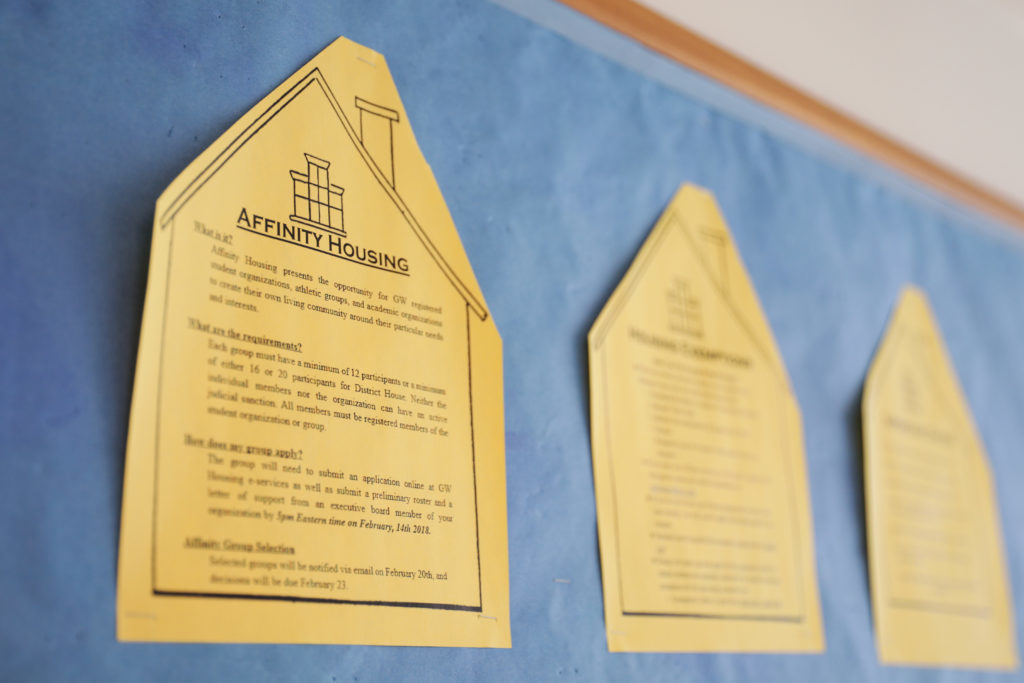More student organizations are looking to affinities for housing than ever before.
Eighteen student groups applied earlier this month to fill 14 affinities spots in District House next year, GW’s top housing official said. Residents of the affinities that sent in bids to live in the 16- to 20-person spaces said the housing style is an additional outlet for students to bond within their student group or academic interest.
Affinity housing was initially offered to students in 2015, shortly after the opening of District House, as a way for students to live with people of common interests, like sports teams or student organizations.
Seth Weinshel, the assistant dean of housing and financial services, said interest in affinity housing grew this year, creating a more competitive selection process for District House affinities. He said the four groups that did not receive affinity housing space in District were placed in Munson Hall, though a group of students from the Politics and Values program qualified as an academic residential community and was moved to District House instead.
“There’s a big ‘tragedy of the commons’ type of thing – all of the sudden we realize people were going to leave a mess and no one was going to clean it up.”
For the first time next year, Weinshel said there will be three academic residential community groups – Politics and Values, the Honors Program and the School of Engineering and Applied Sciences community.
“We believe that the space offered to affinities and the support that the groups received are factors that make groups choose affinity housing,” Weinshel said in an email. “Creating community in the residence halls is one of core functions of what [Center for Student Engagement] does, and affinity housing allows for very specific communities to form and prosper.”
Officials advertise affinity housing to students through email and social media, and hold several information sessions about the communities during the academic year, he added.
Students living in an affinity group said the area forms a well-established community when peers of common interests live together. But they said members of student organizations often cycle out of the living space after a year because they can live more independently with their own residence hall room.
Jag Guerrette, the group coordinator for the ultimate frisbee affinity, which has reapplied for an affinity with 20 members, said the team’s affinity has existed since District House opened in 2016. He said the space is an “integral” component of team bonding because teammates can convene regardless of whether they live on the floor.
“My first semester, every single Thursday we would go over there after practice and watch the ‘British Baking Show’ – it was kind of weird, but it was fun,” Guerrette said. “It’s a pretty cool gathering spot.”
Students in other affinities said few or none of the same students are returning to live in their affinity next academic year. They said affinities can cause drama among peers, like disputes about how the central kitchen is shared, and are often less attractive for upperclassmen because they have more off-campus housing options.
John Jeffrey, a resident of the Politics and Values alumni affinity in District House, said members of the academic program’s year-old affinity did not reapply, though the program’s freshman members applied for an affinity and will have an academic residential community next academic year. Members realized that coordination “hurdles,” like deciding who would clean the kitchen, was difficult to hold people accountable, he said.
“There’s a big ‘tragedy of the commons’ type of thing – all of the sudden we realize people were going to leave a mess and no one was going to clean it up,” he said.
“Affinity life is only for certain people.”
Lee Febos, a member of the Allied in Pride affinity, said there are no returning members looking to live in the space next year, but the organization was still able to recruit 16 members to live in next year’s affinity.
Febos said in the Allied affinity, LGTBQ students, who may have had “bad experiences” with roommates freshman year, often find homes in the affinity because they encounter “more people who will validate you and who don’t see you’re existence as having to be questioned.”
In the cross country affinity, two of 20 members will be returning residents.
Mitchell Finkel, who is one of two students returning to the cross country affinity next year, said members were hesitant to return because coordinating group chores was a challenge and some upperclassmen disliked “constant social interaction” with the other affinity members.
“Affinity life is only for certain people,” he said. “I personally loved it and I was always with somebody, but other people thought there was drama or that they just couldn’t deal with 20 people there.”
Amanda Hillware contributed reporting.





